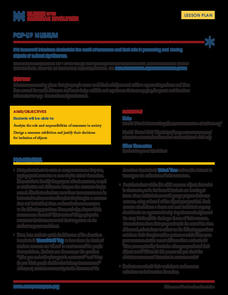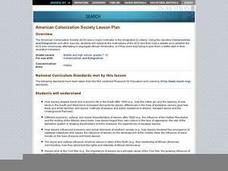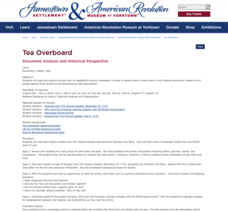Facing History and Ourselves
The Legacies of Reconstruction
The final lesson in the seven-resource Reconstruction Era collection examines the legacies of Reconstruction. Class members investigate why the period has been called an "unfinished revolution," "a splendid failure," and "the second...
Curated OER
Interpreting Foundation Documents of the American Republic
Explore early American documents that qualify as primary sources. Tenth and eleventh graders use the provided worksheets to analyze the texts of the Articles of Association, the Declaration of Independence, the Articles of Confederation,...
Museum of the American Revolution
George vs. George
It's George versus George in the battle for the American colonies. An interesting activity compares the leadership of George Washington and King George III during the American Revolution. Scholars read text, compare portraits, and...
Museum of the American Revolution
Pop-Up Museum
Museums offer more than interesting exhibits—they are key to keeping history alive. An immersive activity uses a virtual field trip to show academics the importance of museums in preserving history. Young historians learn how museums are...
Curated OER
Historical Perspective
Students research the different perspectives of important groups and figures involved in the American Revolution and apply their findings to write and perform monologues depicting this pivotal time in history.
National First Ladies' Library
The First Great Awakening
Connecting social studies and American literature, students study the Great Awakening and draw comparisons between its impact on England and on parts of Colonial America. They research the lives and experiences of people who lived during...
Ford's Theatre
How Perspective Shapes Understanding of History
The Boston Massacre may be an iconic event in American history, but perhaps the British soldiers had another point of view. Using primary sources, including reports from Boston newspapers and secondary sources from the British...
Curated OER
What Makes a General?
Students explore the duties of commander-in-chief. In this George Washington activity, students research Revolutionary War military leaders and examine the relationships they had with George Washington.
Curated OER
Abolish the Office of Governor
Students explore the history of the Pennsylvania Constitution of 1776. In this historical analysis lesson, students analyze the constitution of the state and determine how citizens benefited (or didn't benefit) from the document....
Curated OER
American Colonization Society Lesson Plan
Students read an article online "Colonization and Emigration" and break into debating groups. They research points that support their side, namely whether or not the American Colonization Society was for or against segregation. They...
Curated OER
Was There an Industrial Revolution? New Workplace, New Technology, New Consumers
Young scholars examine the changes in the U.S. in the period of industrialization before the Civil War. They analyze census data, list/describe inventions and innovations, explore various websites, conduct a Factory Simulation activity,...
The Alamo
A Lesson in Citizenship
What does it mean to be an American citizen? Lieutenant Colonel Commander William Barret Travis believed that it meant honor to country first—even above one's own life. Middle and high schoolers read his final letters from the Alamo that...
NPR
This Isn't Right: A History of Women in Industry
Women were in the workplace long before Rosie the Riveter pushed up her sleeve. Learn about the working options available to women during the Industrial Revolution, the Progressive Era, and the Great Depression with a lesson that prompts...
Constitutional Rights Foundation
Why We Have Freedom of the Press
A newspaper receives documents that reveal not only a devastating secret the public needs to know, but also troop movements that could put American lives at risk: to publish or not to publish? Using background readings, discussion...
Academy of American Poets
Teach This Poem: "Old South Meeting House" by January Gill O'Neil
The vaulted ceiling of the Old South Meeting House has heard many voices. Young scholars read an excerpt about its importance in American history and then do a close reading January Gill O'Neil's poem, "Old South Meeting House." After...
Curated OER
Abigail as Political and Historical Observer
Lesson five in the series asks scholars to examine letters Abigail Adams wrote about her experiences during American Revolutionary War battles, her thoughts on slavery, and her concerns for her husband.
Curated OER
Industrialization of the American Landscape
Students summarize the three sectors of industry and how these sectors applied to the Industrial Revolution. Students apply their skills in research and note-taking, as well as vocabulary building through web organizers. Students...
Curated OER
What Made George Washington a Good Military Leader? What Are the Qualities of a Good Military Leader?
Students examine the military leadership of George Washington. In this military leadership activity, students use Internet and print resources to research Washington's military experience and his successful military campaigns. Students...
US House of Representatives
Hispanic Congressional Representation in the Era of U.S. Continental Expansion, 1822–1898
From the Louisiana Purchase to the Spanish-American War, the history of the United States is intertwined with the story of Hispanic Americans. Using an article about Hispanics in Congress during the 1800s, learners research their lives...
Curated OER
Industrial Revolution in America: Exploring the Effects of the Heat Engine on the Growth of Cities
Students research the development of the steam engines. In this US history lesson, students analyze the impact of this invention to civilization. They discuss the events leading to the growth and development of different cities.
Jamestown-Yorktown Foundation
Tea Overboard
While less well known than the event in Boston, the Yorktown Tea Party was equally decisive in turning community sentiment against Great Britain. To gain an understanding of why the colonists objected to the Tea Act, young historians...
NPR
Progressive Era Lesson Plan
The women working for equal rights in the early 20th century weren't a part of one large group; rather, they were members of dozens of small groups focused on social reform. Explore the ways groups in the Progressive Era like National...
National Endowment for the Humanities
The Argument of the Declaration of Independence
When in the course of a course on historic American events, it becomes necessary for learners to examine, with decent respect, the Declaration of Independence, it becomes evident that there are six separate and equal parts of that...
Curated OER
Abraham Lincoln on the American Union: " A Word Fitly Spoken"
Students consider Lincoln's perspective. In this presidential perspectives lesson, students explore the political thoughts of Lincoln through a series of lessons that make use of primary source analysis. They hypothesize and take a...
Other popular searches
- American Revolutionary War
- American Revolution Causes
- American Revolution Projects
- The American Revolution
- American Revolution Battles
- Mind Map American Revolution
- Road to American Revolution
- American Revolution Women
- American Revolutionary Figures
- American Revolution Music
- Causes of American Revolution
- Latin American Revolutions

























